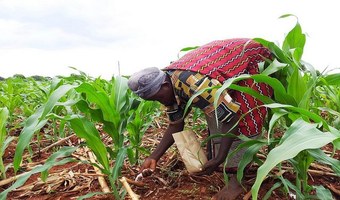 Kilifi farmers are slowly courting organic fertilizer in a move meant to shift them from conventional fertilizers that have been responsible for increasing soil acidity that is taking its toll on yields. This comes as reports indicate that 80 percent of Kenya’s arable land is highly acidic a fact demonstrated by dwindling yields in recent times.
Kilifi farmers are slowly courting organic fertilizer in a move meant to shift them from conventional fertilizers that have been responsible for increasing soil acidity that is taking its toll on yields. This comes as reports indicate that 80 percent of Kenya’s arable land is highly acidic a fact demonstrated by dwindling yields in recent times.
Yields from most arable soils in the country have been on a free fall and this is largely attributed to the continuous use of DAP fertilizers which experts say have reduced the soil PH levels. A recent joint report by FAO and Kenya's Agriculture Ministry revealed that continuous use of fertilizers such as DAP (Diammonium phosphate) has resulted in reduced soil pH and declining productivity. The survey which did soil mapping in the country deduced that soils in approximately 7.5million hectares of arable land in the country are highly acidic. The best PH levels in the soil is 6.5-7 but according to the report, most of the arable land recorded levels below 5.5.
As part of a rescue plan for the country’s soils, the researchers in their report recommend that farmers shift from the traditional fertilizers and embrace the new brands of fertilizers that do not contain phosphoric acids. An example of that is the locally manufactured Mavuno fertilizer by Athi River Mining. The fertilizer introduced in the country over 10 years ago is now gaining prominence due to its’ ability to fix acidic soils coupled with the fact that it does not contain phosphoric acid which is now responsible for the soil intoxication.
The country’s food basket region of rift valley especially Trans-Nzoia have bored the brunt of this problem with maize yields dwindling to even less than 10 bags per acre. According to Lawrence Munene an agricultural expert from Mavuno, once the soil is intoxicated with high acidic levels, there yields can never blossom due even if a farmer uses the best farm inputs. “The phosphoric acid that is accumulated in the soil over time due to continued use of fertilizer blocks the root system of the plant and therefore preventing it from absorbing the nutrients. This is the reason as to why most farmers continue complaining of poor plant growth with maize characterized with stunted growth and yellowing of leaves,” explained Munene.
The free supply of farm inputs to a section of Rabai farmers is part of an on-going campaign to enlighten farmers of the uniqueness of the product in fixing soil fertility as well as tripling yields. The farmers in Rabai were each supplied with 50kgs of Mavuno planting and top dressing fertilizer, 50kg high calcium agricultural lime and 2kgs of hybrid maize seed. These materials are sufficient for a ¼ acre demo plot of land which in return is expected to generate an estimated net cash value of Sh16,000. Overall farmers in the area expected to harvest an approximate 7 to 8 bags each from this demo plot. The initiative is aimed at being a pioneer program for sustainable solutions in terms of food and cash income to Rabai residents through agriculture.
Speaking in Rabai Deputy Governor Kenneth Mwakombo said, “This initiative not only promises to boost our yields in Rabai for the next harvest, but also sets precedence for a long-term financial sustainability programme for our farmers. As government, we are keen to partner with the private sector to embrace new technologies that will improve the capacity for our arable lands to provide food for the people of this country.”
Similar efforts were carried out in 2010 in Rift valley registering impressive results that have since then seen widespread adoption of the fertilizer in that area especially among maize farmers. “We know that our fertilizer is one of the solutions available to fix the soil problem but we cannot force farmers to adapt it. Therefore, in order to ensure its’ widespread use and save the soils, we identify groups of farmers or institutions to use it and compare results with other conventional products.” In 2010, the firm offered free Mavuno farm inputs to over 100 primary schools in Rift valley. “Each school planted maize on one acre piece of land with Mavuno and another acre with the conventional fertilizer.
An acre of Mavuno produced over 42 bags while the conventional ones only got about 15 bags,” explained Munene. The impressive results was a goodwill rubber stamp for Mavuno fertilizer to most farmers culminating with its’ endorsement from various quarters including the Trans Nzoia county government for its ability to boost crop yields by reducing acidity and adding onto soil nutrients.
The fertilizer is customized and categorized according to the type of crop and soil nutrient needs. Munene noted that there are various brands specifically meant for different crops. “Every crop needs different nutritional values to thrive and therefore we factored in that important point in order to ensure that farmers get the best from every piece of coin they spend on our fertilizer.” Mavuno is packaged in packs of 1,10,25 50 kgs. Munene added that the fertilizer is packaged with all the nutritional needs of plants including primary, secondary and micro nutrients making a multipurpose product. Despite the high nutritional value Mavuno is retailing at a much lower price compared to the conventional ones with a 50kg bag going for Sh2500.